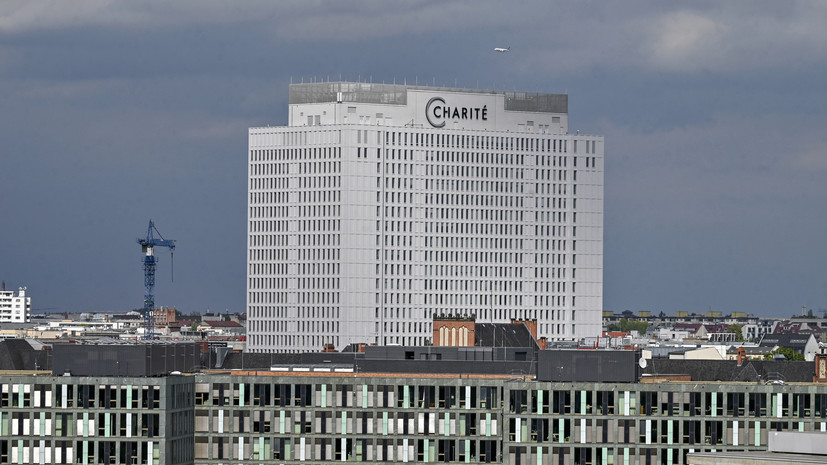The official representative of the Cabinet of Ministers of the Federal Republic of Germany Steffen Seibert confirmed the reports that Angela Merkel visited Alexei Navalny during his stay in the Berlin clinic "Charite".
Seibert noted that there is no talk of a "secret" meeting between the chancellor and Navalny.
According to him, it was a private visit.
Earlier, Der Spiegel reported, citing sources, that the chancellor secretly visited a medical facility.
"Yes, I can (confirm the fact of the meeting between Merkel and Navalny. -
RT
)," Seibert said.
The representative of the Cabinet stressed that the government, in principle, does not report on private meetings of Merkel.
The fact of visiting the clinic by the German Chancellor was also confirmed by Navalny himself.
“There was a meeting, but you shouldn't call it“ secret ”.
Rather, a private meeting and conversation with the family, ”he wrote on Twitter, expressing his gratitude to the Chancellor for the visit.
Recall that the incident with Alexei Navalny occurred in August 2020.
On the 20th, the blogger flew from Tomsk to Moscow.
On board the plane, he felt bad, and the liner urgently landed in Omsk, after which Navalny, who was unconscious, was urgently hospitalized.
The patient's relatives insisted on transferring Navalny to the Charite clinic in Berlin.
After Russian doctors were able to stabilize the blogger's condition, he was transported to Germany.
Subsequently, the German authorities reported that Navalny was allegedly poisoned with a nerve agent from the Novichok group.
At the same time, the Russian doctors who treated the blogger repeatedly indicated that the tests carried out did not reveal traces of toxic substances in the patient's body.
Later, the head of the German Foreign Ministry, Heiko Maas, did not rule out the introduction of sanctions in connection with the situation around Alexei Navalny.
One of the measures considered in this regard, the minister called the suspension of the implementation of the Nord Stream 2 project.
In addition, the head of EU diplomacy, Josep Borrell, also spoke about the likelihood of introducing pan-European sanctions.
The Russian side has repeatedly called not to politicize the situation with Navalny.
For example, in early September, Russian Deputy Foreign Minister Alexander Grushko, during a meeting with EU Ambassador Markus Ederer, stated that unfounded accusations in the genre of "megaphone diplomacy" against Moscow were inadmissible.
At the same time, Russian Foreign Minister Sergei Lavrov said that the country would not leave unanswered new Western sanctions due to the situation with Navalny if they were introduced.
Navalny was discharged from the hospital in the Berlin clinic "Charite" on September 23 after 32 days of treatment.
German doctors indicated that the Russian's health had improved to such an extent that emergency treatment could be stopped.
Recall that on September 23, Moscow sent a note to the German permanent mission to the OPCW to clarify the situation with Navalny.
In particular, the Russian side asked to transfer the test results, biomaterials and other clinical samples that Berlin has.
On September 25, the German side confirmed receipt of the note.
“I can confirm that the German representation of the FRG in the OPCW received yesterday a Russian note on the situation with the poisoning of Alexei Navalny,” RIA Novosti quotes the words of the deputy official representative of the FRG government Martina Fitz.
She noted that the diplomats will respond within ten days.
Meanwhile, the permanent representative of the Russian Federation to the OPCW, Alexander Shulgin, said that the technical secretariat of the organization had exceeded its powers by accepting a request from the FRG to provide so-called technical assistance in the situation with Navalny.
Shulgin noted that Berlin does not need help to analyze the samples.
“We believe that in the adoption of the request of the FRG by the Customs Union of the OPCW for the provision of so-called technical assistance, there are signs of exceeding its powers, going beyond the existing mandate.
- quoted Shulgin RIA Novosti.
"Berlin does not require any assistance from the OPCW to analyze the samples, as it demonstrated by stating that the Bundeswehr laboratory has done the necessary work."
According to him, along with this, the German side addressed bilaterally to France and Sweden to confirm their conclusions, bypassing the OPCW.
Meanwhile, Germany assessed the prospects of forming a joint group with the Russian Federation on the situation with Navalny.
According to the head of the Bundestag Committee on Economy and Energy Klaus Ernst, the chances of such an outcome are small due to the "political climate" in Germany.
“No matter how much I welcomed the joint commission of our parliaments, which could request the results of the investigation, I currently, in this regard, and given the current political climate in Germany, do not see any prospects for creating a joint commission of the State Duma and the Bundestag,” the parliamentarian said in an interview with RIA News.

